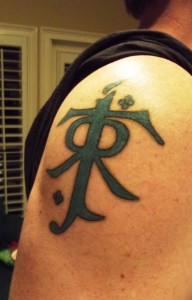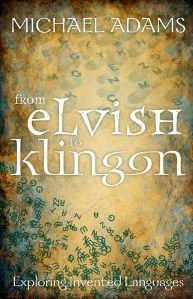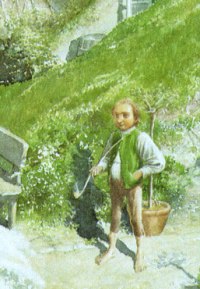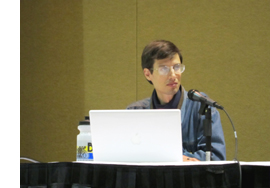 Our own Cliff “Quickbeam” Broadway got the chance to have a few words with Richard Armitage in the Hall H press session. Armitage read The Hobbit as a young child of seven, and (among other things) spoke about the responsibility that comes with taking on a role in a universe with such depth that it feels like it could have existed.
Our own Cliff “Quickbeam” Broadway got the chance to have a few words with Richard Armitage in the Hall H press session. Armitage read The Hobbit as a young child of seven, and (among other things) spoke about the responsibility that comes with taking on a role in a universe with such depth that it feels like it could have existed.
Choice quote: “…and then actually putting the costume on and trying to make that character live and breath and walk and talk. It’s like you’re given this responsibility to every other person who’s read them, who’s reading the books for the first time or who has read them when they were seven. That’s the responsibility — and you have to own that for everyone.”
Posted in:
Share:

 I never considered myself a tattoo guy.
I never considered myself a tattoo guy.
Until now.
It started innocently enough. I wanted to commemorate what I considered no small achievement: reading all 12 volumes of the History of Middle-earth in one year. I made the pledge and started the trek in January of 2011, and managed to turn the last page in mid-December of that year. (I wrote about the experience here and here)
So what could I do to mark this considerable milestone?
I’d had every opportunity in my younger days to become one of the Inked. Lived with several bands, traveled around with all sorts of characters in a circus-like caravan for years before pretending to settle down and got a “real job”.
But never once did I feel the urge to get a tattoo. Big, small, cool or silly, it never crossed my mind as anything I would ever want to do. “How permanent!” “Do I really want everyone to see and judge me?” “Wouldn’t it affect my job or the impression customers and co-workers would get?” All of that crossed my mind, but not in any sort of huge, conflicting way. I just never wanted one.
So why, when searching for an appropriately Big Sign statement to mark the conclusion of my most recent Tolkienian Journey, was that one of the first things that came to mind?
Mayhap, as some have speculated (myself included), it’s a sort of midlife crisis, only instead of a Porsche I got some ink. (By the way – if this truly is the midpoint of my life, 50% gone and 50% still to come, I’ll take it, say thankee-sai.)
Others have said, simply, “I think he’s lost his mind…”
Possibly so.
Continue reading “Under My Skin: Externalizing Tolkien”
Posted in:
Share:

 Back in 2001, I wrote Glossopoeia for Fun and Profit (also reprinted in The People’s Guide to J.R.R. Tolkien), for our Green Books department, in which I discussed three examples of invented languages: Esperanto, Elvish, and Klingon. For those who found that necessarily brief article of interest, University of Indiana linguistics professor Michael Adams has now edited a new book, From Elvish to Klingon: Exploring Invented Languages (Oxford University Press, 2011), comprising eight essays (including his a general introductory essay by Adams) about linguistic invention, though not precisely the “invented languages” suggested by the book’s title, as we will see. Each essay is accompanied by an appendix by Adams that extends or clarifies some aspect of the essay.
Back in 2001, I wrote Glossopoeia for Fun and Profit (also reprinted in The People’s Guide to J.R.R. Tolkien), for our Green Books department, in which I discussed three examples of invented languages: Esperanto, Elvish, and Klingon. For those who found that necessarily brief article of interest, University of Indiana linguistics professor Michael Adams has now edited a new book, From Elvish to Klingon: Exploring Invented Languages (Oxford University Press, 2011), comprising eight essays (including his a general introductory essay by Adams) about linguistic invention, though not precisely the “invented languages” suggested by the book’s title, as we will see. Each essay is accompanied by an appendix by Adams that extends or clarifies some aspect of the essay.
Adams’s introductory chapter deals with the spectrum of linguistic invention, and considers the motivations for such inventions. He considers whether invented languages are an attempt to re-create “the language of Adam”, i.e., a perfected language as spoken by Adam before the fall (it appears that Adams takes the Biblical texts quite literally here), and considers slang and poetry as examples of human linguistic creativity; Adams is the author of Slang: The People’s Poetry(Oxford Press, 2009).
Continue reading “Michael Adams — From Elvish to Klingon: Exploring Invented Languages”
Posted in:
Share:

 The latest episode of the BBC2’s “Planet Word” has Stephen Fry, cast in the role of the Master of Laketown, speaking with Peter Jackson about Tolkien’s use of languages in The Hobbit and The Lord of the Rings.
The latest episode of the BBC2’s “Planet Word” has Stephen Fry, cast in the role of the Master of Laketown, speaking with Peter Jackson about Tolkien’s use of languages in The Hobbit and The Lord of the Rings.
Roads go ever, ever on, under cloud and under star,
Yet feet that wandering have gone, return at last to home afar.
Eyes that fire and sword have seen, and horror in halls of stone,
Look at last on meadows green, and trees and hills they long have known.
Stephen Fry’s recital of Tolkien’s poem sets the tone for his little discussion with PJ in a most apt setting – the Bag End set down in New Zealand, where filming for the upcoming Hobbit films is currently on in full swing.
Folks in the UK can watch the stream via bbc.co.uk, while those located internationally can catch a snippet over on YouTube (4:17 into the video).
A transcript is also up on our message boards courtesy of board member QuackingTroll.
Posted in:
Share:


Geek Kon is a relatively young gathering, started in 2007 by students and alumni of the University of Wisconsin-Madison. The fifth con was held this weekend, September 9 to 11, with 1400 fans attending. There were three Tolkien-related events, allinvolving David Salo, an expert on the professor’s invented languages.
David’s main contribution to the scholarly study of those languages has been his book A Gateway to Sindarin. He also, however, acted as the “Tolkien linguist” for Peter Jackson’s film adaptation of The Lord of the Rings. In that capacity, he translated phrases and passages from the script into various Middle-earth languages, primarily Elvish. David also devised passages in Khuzdul (the secret language of the dwarves), including choral portions in the musical score for the scenes in Moria. David also translated the phrases seen engraved on the swords and other armaments, and he recorded readings of his translations for the language coaches to use in training the actors.
(I have known David for years, and in September of 2004 I interviewed him for my book, The Frodo Franchise. I used material from that interview in Chapter 3, “Handcrafting a Blockbuster,” pp. 95-6.)
I don’t think it has been publicly announced yet, but fans will be delighted to know that David is currently performing the same tasks for The Hobbit. Although his contract obviously restricts him in what he can say about the actual filming, his first talk shared with us what he could reveal. Continue reading “David Salo, Linguistic Consultant for The Hobbit, speaks at Geek Kon”
Posted in:
Share:

After watching the Fellowship of the Ring again, I was reminded how much I enjoyed the music and the songs. During the The Council of Elrond scene there is a song sung in Tolkien’s Elvish language “Sindarin” called ‘Aniron (Theme for Aragorn And Arwen)’ . I did a little digging and have found an interview with Enya where she not only talks about her songs but her love for The Lord of The Rings, how she got involved with the production and Tolkien’s Elvish language’s. Enjoy!
Posted in:
Share:

 Our own Cliff “Quickbeam” Broadway got the chance to have a few words with Richard Armitage in the Hall H press session. Armitage read The Hobbit as a young child of seven, and (among other things) spoke about the responsibility that comes with taking on a role in a universe with such depth that it feels like it could have existed.
Our own Cliff “Quickbeam” Broadway got the chance to have a few words with Richard Armitage in the Hall H press session. Armitage read The Hobbit as a young child of seven, and (among other things) spoke about the responsibility that comes with taking on a role in a universe with such depth that it feels like it could have existed.





